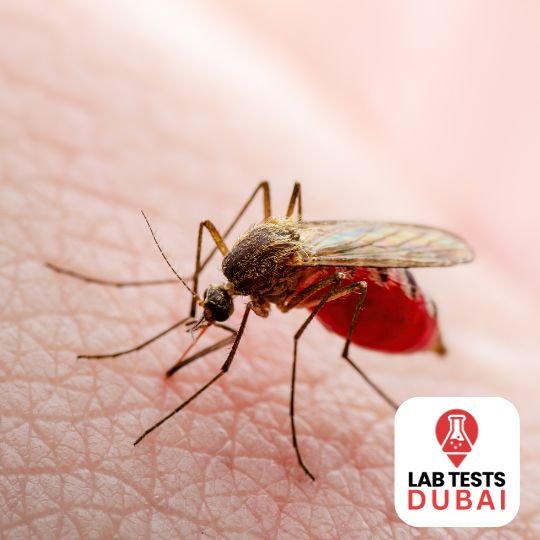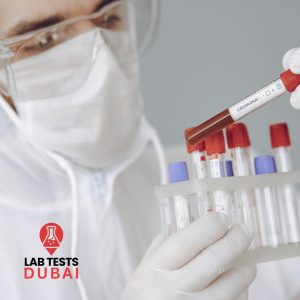Zika Virus IgG & IgM Test – Accurate & Reliable Antibody Detection
1.850,00 د.إ
The Zika Virus IgG & IgM Rapid Test is a highly reliable diagnostic tool designed for the qualitative detection of IgG and IgM antibodies against the Zika virus in human blood, serum, or plasma. This test enables early and past infection detection, aiding in timely diagnosis and disease management. Featuring rapid results within minutes, it is ideal for point-of-care testing in clinical and field settings.
Sample Type : Serum
Methodology : EIA
TAT : 2-3 Weeks
Description
Zika Virus IgG Test – Accurate Detection of Past Zika Exposure
The Zika Virus IgG Test from Lab Tests Dubai is a specialized blood test that detects IgG antibodiesagainst the Zika virus—a mosquito-borne flavivirus that spread globally during outbreaks in South America, Southeast Asia, and the Caribbean.
While most infections are mild or asymptomatic, Zika virus poses a severe risk during pregnancy, potentially causing:
- Congenital Zika Syndrome
- Microcephaly (abnormally small head)
- Brain abnormalities, vision/hearing loss, developmental delays
This test is essential for:
- Women planning pregnancy after travel to endemic areas
- Pregnant women with travel history or unexplained ultrasound findings
- Travelers returning from Zika-risk regions
- Couples undergoing fertility treatments
- Public health screening in high-risk zones
Using high-sensitivity Enzyme Immunoassay (EIA) technology, this serum-based test detects long-term IgG antibodies, which appear 2–3 weeks after infection and persist for months to years, helping OB-GYNs and infectious disease specialists assess prior exposure and guide pregnancy planning.
Available with home blood collection, Lab Tests Dubai ensures accurate, private, and stress-free testing, so you can plan your family with confidence.
Why You Need This Test
If you’re planning a baby and recently traveled to Brazil, Thailand, or the Philippines, this test could protect your unborn child from life-altering birth defects.
You need the Zika IgG Test if:
- You’ve traveled to or lived in a Zika-endemic country
- You’re planning pregnancy or in early pregnancy
- You had fever, rash, or red eyes during or after travel
- You’ve had unprotected sex with someone who traveled to a high-risk area
- Your prenatal ultrasound shows abnormal brain development
- You work in public health or travel medicine
This test helps:
- Confirm past infection and immunity
- Reduce anxiety during pregnancy
- Avoid unnecessary amniocentesis or ultrasounds
- Guide safe conception timing
Early testing = safer pregnancy and peace of mind.
Symptoms That Indicate This Test
Consider the Zika IgG Test if you experience:
✅ For Acute Zika Infection:
- Low-grade fever
- Maculopapular rash (spreading from face to body)
- Conjunctivitis (red eyes without discharge)
- Joint pain (especially hands and feet)
- Muscle pain, headache
✅ For High-Risk Pregnant Women:
- Travel to endemic regions (Central/South America, Pacific Islands, Southeast Asia)
- Sexual contact with exposed partner
- Fetal brain abnormalities on scan
✅ For Silent Infection:
- No symptoms at all, up to 80% of cases
Even mild or asymptomatic infection can harm a developing fetus.
Natural Production: How IgG Antibodies Signal Past Infection
Zika virus is transmitted by:
- Aedes mosquitoes (same as dengue, chikungunya)
- Mother-to-fetus transmission
- Sexual contact (virus persists in semen)
- Blood transfusion (rare)
After infection:
- IgM antibodies appear 3–5 days post-infection → short-lived (2–12 weeks)
- IgG antibodies rise after 2–3 weeks → persist for months or years
What the Results Mean:
- IgG Positive, IgM Negative → Past infection (likely immune)
- IgG Negative → No prior exposure (vulnerable)
- Both IgG and IgM Positive → Recent infection (requires urgent OB follow-up)
Important Notes:
- Cross-reactivity with dengue, yellow fever, or other flaviviruses can cause false positives
- Plaque Reduction Neutralization Test (PRNT) may be needed for confirmation
- No vaccine is available
This test is part of pre-pregnancy and prenatal infectious disease panels.
What Happens If Untreated? Risks of Ignoring Zika Exposure
Ignoring Zika exposure can lead to:
⚠️ Congenital Zika Syndrome – microcephaly, brain calcifications
⚠️ Vision & Hearing Loss – in newborns
⚠️ Developmental Delays – motor, cognitive, speech
⚠️ Guillain-Barré Syndrome (GBS) – rare autoimmune nerve disorder
⚠️ Pregnancy Loss or Stillbirth
The good news? Risks can be reduced with:
- Delaying pregnancy 3–6 months after exposure
- Mosquito bite prevention (repellent, clothing, nets)
- Safe sex practices (condoms for 3–6 months post-exposure)
- Regular fetal monitoring if exposed during pregnancy
Early testing = protection for your baby and informed decisions.
How to Prepare for the Test
To ensure accurate results:
✅ No fasting required
✅ Continue your regular medications
✅ Wait at least 3–4 weeks after travel or symptom onset for optimal antibody levels
✅ Inform your doctor of:
- Travel destination and duration
- Symptoms during or after travel
- Pregnancy status or plans
A serum blood sample is collected via standard draw—available at our labs or via home collection.
Test Overview: Enzyme Immunoassay (EIA) Method
Interpretation:
- Negative → No evidence of past infection
- Positive → Likely past exposure (immune, but virus may have affected fetus if infected during pregnancy)
- Equivocal → Repeat or confirm with PRNT
Note: Often paired with Zika IgM and dengue testing to rule out cross-reactivity.
Benefits of the Zika IgG Test
🔹 Pregnancy Protection
Know your risk before conception.
🔹 Travel Health Clarity
Get answers after visiting high-risk zones.
🔹 Avoid Unnecessary Procedures
Rule out recent infection before amniocentesis.
🔹 Peace of Mind
Stop worrying—know your immune status.
🔹 Public Health Awareness
Help prevent congenital disease.
If you’re planning a baby after travel, the Zika Virus IgG Test gives you the answers you need in 2–3 weeks.





Reviews
There are no reviews yet.